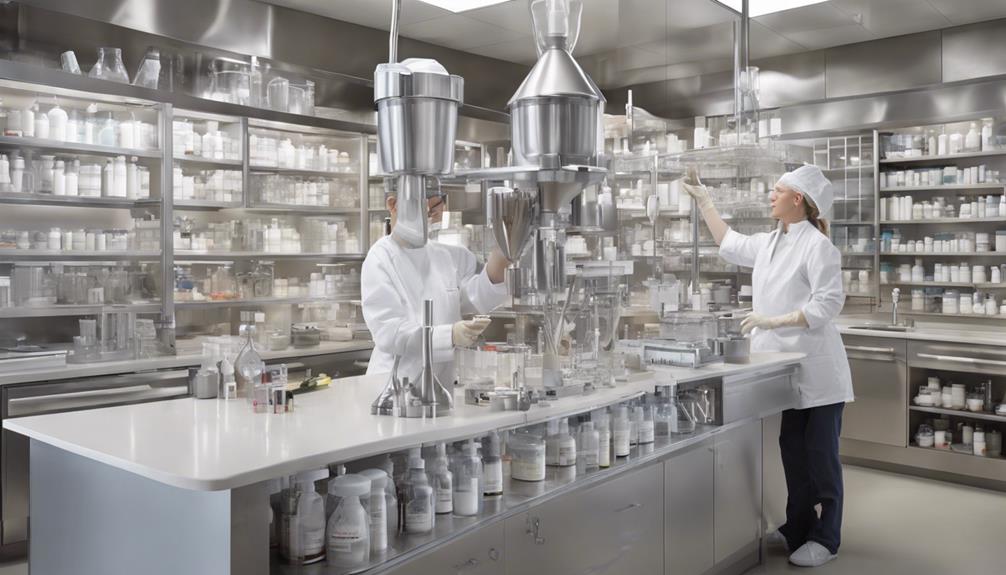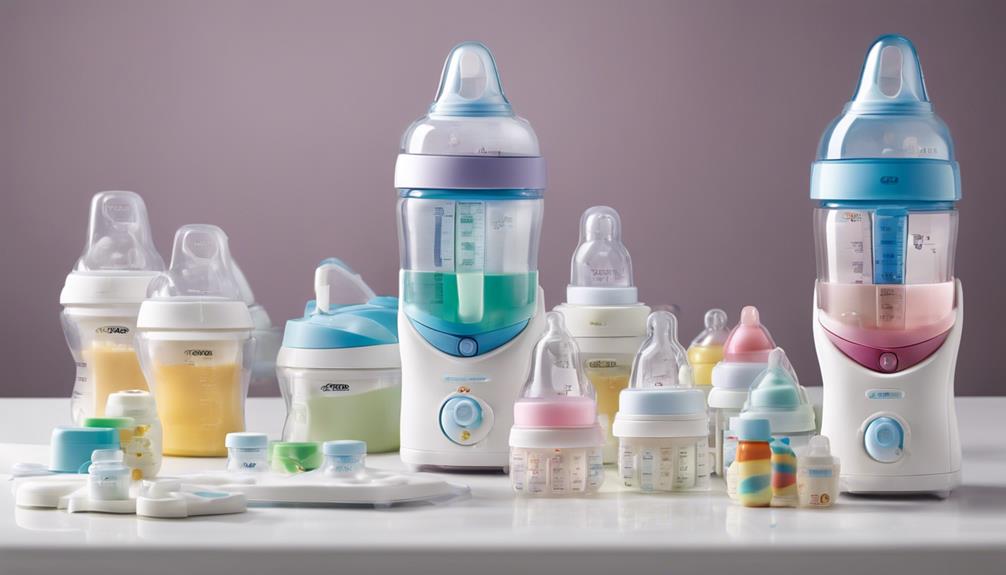As new parents, we understand that 83% of babies in the United States are fed with formula by the age of six months. Following important guidelines for formula feeding is crucial for the development and health of your baby.
From selecting the appropriate formula to maintaining hygiene during preparation, each step plays an essential role in your baby's development. Let's explore key considerations for formula feeding that can set the foundation for a healthy feeding routine and support your baby's nutritional needs effectively.
Key Takeaways
- Consult a healthcare provider to select the right formula for your baby's specific needs.
- Follow proper formula preparation steps to ensure hygiene and accuracy.
- Establish a feeding schedule based on your baby's cues for a healthy routine.
- Monitor your baby's intake closely to support their development and hydration needs.
Choosing the Right Formula
When selecting the appropriate formula for your baby, understanding the different types available and their specific benefits is important. Baby formulas come in three main types: ready-to-use liquid, concentrated liquid, and powdered. Each type has its own advantages and requires specific preparation methods.
Specialized formulas are also available for premature babies or infants with specific health conditions, ensuring they receive the necessary nutrients for healthy development. These formulas are fortified with essential vitamins and nutrients like iron and DHA to support your baby's growth.
It is vital to consult with a healthcare provider when choosing the right formula for your baby. They can help assess your baby's individual needs, allergies, or sensitivities to make sure they receive the best possible nutrition. Additionally, sticking to one brand of formula can help maintain consistency for your baby's digestive system and avoid any potential issues that may arise from switching between different brands.
Proper Formula Preparation

To guarantee the proper preparation of formula for your baby, it is important to follow strict hygiene practices and adhere to the manufacturer's instructions meticulously. Proper mixing of formula is vital for your baby's health and safety. Always wash your hands thoroughly before preparing bottles to prevent contamination. Follow the instructions provided on the formula container for accurate proportions and mixing techniques. Make sure that powdered formula is prepared using very hot water to eliminate any harmful bacteria that may be present. In situations where water safety is a concern, opt for bottled water to reduce risks of contamination. Learning safe preparation methods for formula is essential in maintaining your baby's well-being and preventing infections.
| Formula Preparation Tips |
|---|
| Wash hands before preparing bottles |
| Follow manufacturer's instructions for mixing |
| Use hot water for powdered formula |
Establishing a Feeding Schedule
Establishing a feeding schedule for your newborn is important in making sure they receive the necessary nourishment and promoting healthy eating habits. Newborns typically require feeding 8 to 12 times a day to meet their nutritional needs adequately. By paying attention to your baby's hunger cues, you can start to establish a routine that works best for both of you.
Initially, feeding your newborn on demand is vital to make sure they receive adequate nourishment, but as your baby grows and their stomach capacity increases, they may naturally go longer between daytime feedings. Responding to your baby's signals and routine is key in shifting from on-demand feeding to a more structured feeding schedule.
This gradual change can help promote healthy eating habits early on and make certain that your baby gets the nourishment they need while also fostering a sense of predictability and comfort in their daily routine.
Monitoring Baby's Intake
Monitoring your baby's intake is essential for ensuring they're receiving adequate nutrition and hydration during their early stages of development. Here are some key steps to help you keep track effectively:
- Track Wet Diapers: Aim for 6-8 wet diapers a day as a sign of proper hydration levels in your baby.
- Maintain a Feeding Log: Record the amount of formula your baby consumes at each feeding session to monitor their intake accurately.
- Observe Feeding Cues: Pay attention to your baby's cues to feed them when they show signs of hunger, ensuring they eat enough to be satisfied.
Ensuring Hygiene and Safety
After ensuring your baby's intake is monitored appropriately, the next critical step is maintaining strict hygiene and safety measures when formula feeding.
Proper hygiene is paramount; wash hands before preparing infant formula to prevent contamination. Always adhere to package instructions and check the expiration date on formula containers to guarantee safety.
Store prepared formula in the refrigerator to maintain freshness and prevent bacterial growth, thereby safeguarding your baby's health. Thoroughly cleaning bottles and nipples before each use is vital in eliminating germs and reducing the risk of infections.
Remember to use only FDA-approved infant formula to guarantee quality and safety for your baby's consumption. By following these guidelines on hygiene, safety, preparation, storage, cleanliness, and using FDA-approved products, you can minimize the risk of contamination and ensure a safe feeding environment for your little one.
Frequently Asked Questions
What Are the Guidelines and Considerations for Formula Feeding?
When formula feeding, we prioritize proper preparation following manufacturer instructions, using FDA-approved formulas, refrigerating opened formula, washing hands, and sanitizing bottles. Consult healthcare providers for specialized formulas for specific health conditions to safeguard baby's well-being.
WHO Guidelines on Formula Feeding?
We follow WHO guidelines on formula feeding. They recommend iron-fortified formula for infants if breastfeeding isn't possible. Proper preparation and storage are essential to prevent contamination. Regular monitoring of growth and development is important for formula-fed babies.
What Do New Parents Need to Know About Bottle Feeding Their Baby?
When bottle feeding a baby, we need to understand cues for hunger and monitor intake. Consistency in formula choice is key for their well-being. Following safe preparation and storage practices guarantees our baby's health and safety.
How Much Formula Should I Give for the First Time?
We should start with 1-2 ounces of formula for the first feeding to gauge the baby's hunger and tolerance. Crucial to adjust based on cues, aiming for about 2.5 ounces per pound of body weight daily, with guidance from healthcare providers.
Conclusion
In conclusion, it's essential for new parents to follow these formula feeding guidelines to ensure their baby's ultimate nutrition and growth. By choosing the right formula, preparing it correctly, establishing a feeding schedule, monitoring intake, and prioritizing hygiene and safety, parents can provide their little ones with the best start in life.
Trusting your instincts and seeking guidance from healthcare providers will help navigate the journey of formula feeding with confidence and success.









